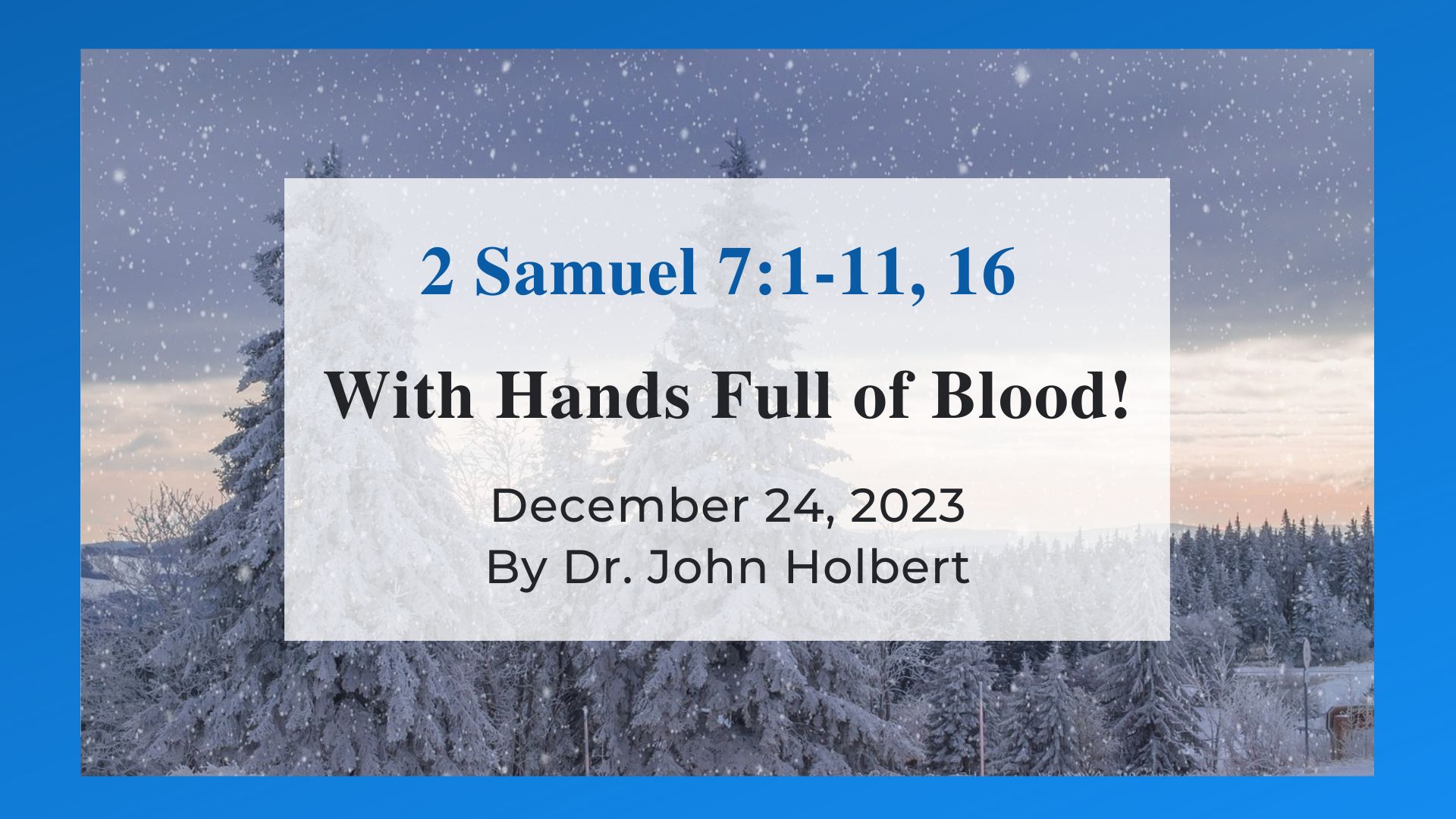With Hands Full of Blood! - Reflections on 2 Samuel 7:1-11, 16
by Dr. John Holbert on Monday, December 18, 2023

With Hands Full of Blood!
2 Samuel 7:1-11, 16
The Peripatetic Hebrew Bible Preacher
After three weeks with Isaiah, who helped us get clearer about what we can expect on Christmas, the sort of God who will appear and how, we now turn in a rather odd direction, toward a passage from the long and complex tale of Saul, Samuel, and David, found in 1 and 2 Samuel and the first two chapters of 1 Kings. If you have read the entire sage—and if you have not I strongly suggest that you do so—this particular text stands out rather like the proverbial thumb. Right in the midst of the travails and triumphs of the second king of Israel, the amazing and at the same time the appalling David, we get this bit about temple building and why David did not get to do it. It has long been known, I assume, by the author of this text that David did not build the temple, but his son and heir Solomon did. The text offers a rather half-disguised reason why the famous David was not in fact allowed to do what he so clearly wanted to do (2 Sam.7:2-3), namely build for his God a wonderful building in which to dwell.
Nathan, the king’s personal prophet, as well as his later conscience, concurs at first with the king’s desire to build, but after a troubling dream, straight from YHWH, he sharply changes his mind and denies David his own building dream. The reason given for the change in plans is subtle: “Thus says YHWH,” thunders the prophet to his king, “Are you the one to build me a house to live in? I have not lived in a house since the day I brought up the people of Israel from Egypt to this day, but I have been moving about in a tent or tabernacle” (2 Sam.7:5-6). YHWH goes on with some heat to remind David that his God had never asked anyone for a “house of cedar” (2 Sam.7:7). YHWH decides to build David as a house and to make his family rulers over Israel forever, his heir building the physical house for YHWH after David has died (2 Sam.7:8-13). From this notion that descendants of David will be rulers always comes the New Testament’s regular attempts to make Jesus a part of David’s forever house, thus assuring theologically that Jesus’s life is for all time.
Hence, here in 2 Sam.7 it is suggested that David cannot build a temple for YHWH, because YHWH neither wants or needs a permanent house in which to live. However, this issue of why David did not build the temple continues to rankle later commentators, most especially that little-read interpreter of the long saga, the Chronicler. This author, writing several centuries after the composition of 1 and 2 Samuel, has a very different take on the entire story, some of which is nearly comical in its rank simplicity and certain refusal to take with any seriousness David’s many flaws, cataloged without sparing us details, in the earlier work. For the Chronicler, the mighty David is peerless, a sweet singer of psalms, a director of Israel’s choirs, and the paragon king who can do no wrong. That fact of course is what makes Chronicles such generally dull reading! There is no David who shatters 4 of the 10 commandments in one chapter (2 Sam.11) to be found in the pages of the Chronicler.
But concerning the matter of why David did not build the temple, a temple that the Chronicler makes so much of as YHWH’s earthly dwelling, a place that his hero David should well have built, thus completing his saga of the king with that glorious building that all may see, the Chronicler adds a curious and perhaps telling reason for David’s non-construction. In 1 Chronicles 28, it is claimed that David was fully ready to start the temple’s construction, had readied all the necessary materials, hired the builders, cleared the site, but was stopped directly by God. “You shall not build a house for my name, for you are a warrior and have shed blood” (I Chronicles 28:3). This is a reason right out of the blue! David, as warrior, whose hands are filled with blood, cannot build a house for YHWH, because YHWH allows no one whose hands are so stained to build a sacred place for God.
I suggest that that notion is a fitting conclusion to the Advent season. No one whose hands are filled with the blood of unrighteousness, who has refused to show compassion to the poor and marginalized, who will not seek liberty for the captives, offer care for the mourners, may receive the gift of the Christmas baby who is all about those very things. We cannot continue to treat the baby Jesus as a sweet and pleasant object on Christmas, we cannot shout our “Hail to the King” anthems, we cannot light our candles and weep silent tears as we hymn “Silent Night,” lest we commodify and neutralize the ancient power and wonder of what Jesus the baby actually represents. Like the bloody David, we may not build anything in which our God may dwell unless we recognize and act with the justice-bearing baby of Bethlehem. That is finally the meaning of this and every Advent. Then, and only then, may we truly celebrate Christmas with our praise-filled righteousness! Then we may shout, with old Scrooge, “Merry Christmas indeed!”
